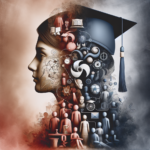The Essential Role of Mentorship: Guiding Individuals with Learning Disabilities Toward Career Readiness
Introduction
Imagine standing at the threshold of a new chapter in your life, where the doors of opportunity hinge on mentorship. For individuals with learning disabilities, navigating the complex pathways toward career readiness can be a daunting task. In today’s world, The Importance of Mentorship: Guiding Individuals with Learning Disabilities Toward Career Readiness takes center stage, highlighting how effective mentorship can empower these individuals to break barriers and blaze trails in their chosen fields.
When we consider the challenges faced by individuals with learning disabilities—whether they pertain to academics, social integration, or self-advocacy—it becomes clear that mentorship is not just a helpful tool but an essential framework for success. Mentors provide guidance, share expertise, and instill confidence, serving as a compass that can direct individuals toward fulfilling careers.
The Landscape of Learning Disabilities
Understanding Learning Disabilities
Learning disabilities encompass a range of disorders that affect the brain’s ability to process information. These may include dyslexia, dysgraphia, dyscalculia, and various attention disorders. According to the National Center for Learning Disabilities (NCLD), approximately 1 in 5 students in the U.S. has some form of learning disability.
Key Statistics on Learning Disabilities
| Statistics | Percentage |
|---|---|
| Students with learning disabilities in U.S. | 20% |
| Students receiving special education services | 13% |
| Students with learning disabilities graduating high school | 80% |
| Students with learning disabilities pursuing higher education | 25% |
The Disparity in Career Readiness
Despite educational advancements, individuals with learning disabilities still face significant hurdles in career readiness. Research indicates they are less likely to pursue post-secondary education and often encounter barriers in the workforce, including prejudice, lack of support, and inadequate training.
The Role of Mentorship in Career Readiness
The Definition of Mentorship
Mentorship can be defined as a relationship in which an experienced individual (the mentor) provides guidance, knowledge, and support to a less experienced person (the mentee). This relationship can span various fields—academic, social, and professional—and it holds particular significance for individuals with learning disabilities.
Why Mentorship Matters
Building Confidence: Mentorship fosters self-esteem and empowers individuals with learning disabilities to trust their abilities.
Skill Development: Mentors can guide mentees in developing critical professional skills such as communication, problem-solving, and time management.
Networking Opportunities: Through mentorship, individuals gain access to vital networks, enhancing job opportunities and career growth.
- Personalized Support: Mentors provide customized strategies and resources tailored to the unique needs of individuals with learning disabilities.
Case Studies Illustrating Success
Case Study 1: The Journey of Sam
Background: Sam, diagnosed with dyslexia, struggled throughout high school and felt lost when it came time to apply for college.
Mentorship Program: Through a local mentorship program, Sam was paired with a mentor who had a similar background.
Outcome: His mentor taught him effective studying techniques and helped him identify his unique strengths. Sam not only graduated high school but also enrolled in a community college program, ultimately achieving his goal of becoming a graphic designer.
Analysis: Sam’s story underscores the transformative impact of mentorship—providing structured support that led to tangible educational outcomes.
Case Study 2: Lisa’s Transformation
Background: Lisa, diagnosed with ADHD, faced challenges managing time and maintaining focus during her studies.
Mentorship Program: Paired with a mentor from the corporate world, Lisa received coaching tailored to her needs.
Outcome: Lisa learned time management strategies and was able to secure an internship, which turned into a full-time job offer.
Analysis: Lisa’s experience highlights how mentorship directly correlates with career readiness and successful labor market entry.
Best Practices for Effective Mentorship
Creating a Supportive Environment
The effectiveness of mentorship hinges on establishing an open, trusting environment where mentees feel safe sharing their challenges. This can be achieved through:
- Regular check-ins
- Setting clear expectations
- Encouragement and positive reinforcement
Tailoring the Mentorship Approach
Recognizing the unique needs of mentees with learning disabilities is critical. Mentors should adapt their communication styles and teaching methods to accommodate various learning preferences, whether that be through visual aids, hands-on practices, or verbal discussions.
Monitoring Progress and Providing Feedback
A structured approach that includes goal setting, progress assessments, and constructive feedback is paramount. Tracking milestones not only keeps the mentee accountable but also motivates them as they see real progress.
Resources for Mentorship Programs
Nonprofit Organizations and Initiatives
Big Brothers Big Sisters of America: Provides one-on-one mentorship to youth, including those with disabilities.
- Learning Disabilities Association of America: Offers resources and partnerships for mentorship programs focused on learning disabilities.
Online Platforms
- LinkedIn for Mentees: Leverage LinkedIn for connecting with potential mentors in specific fields.
- Meetup: Enables individuals with learning disabilities to seek specialized mentorship groups.
The Road Ahead: Future Directions for Mentorship
Integrating Technology
In our digital age, technology can play an essential role in facilitating mentorship. Online platforms, virtual meetings, and accessible resources can make mentorship more reachable for individuals with learning disabilities.
Advocacy for Inclusive Policies
Fostering greater advocacy and awareness around learning disabilities in schools and workplaces will facilitate better mentorship opportunities, leading to more inclusive environments where all individuals can thrive.
Conclusion
As we unpack The Importance of Mentorship: Guiding Individuals with Learning Disabilities Toward Career Readiness, it’s evident that mentorship can significantly alter the landscape for those facing learning disabilities. Through personalized guidance, self-advocacy, and skill development, mentorship not only prepares individuals for career challenges but also enriches their overall life experiences.
By championing mentorship, we join hands in creating a future where barriers crumble, possibilities flourish, and every individual can thrive in pursuit of their dreams. As we move forward, let’s commit to being mentors and advocates for those who may need an extra hand, illuminating pathways to success.
FAQs
1. What is the primary purpose of mentorship for individuals with learning disabilities?
Mentorship aims to provide support, guidance, and resources tailored to the individual’s needs, facilitating personal and professional growth.
2. How can I find a mentor for someone with learning disabilities?
You can explore local organizations, community programs, or online platforms like LinkedIn to connect individuals with appropriate mentors.
3. What qualifications should mentors possess?
Ideally, mentors should have relevant experience, a background in working with individuals with learning disabilities, and a willingness to provide tailored support and guidance.
4. What are some effective mentorship techniques?
Effective techniques include active listening, encouragement, personalized goal setting, and regular progress assessments.
5. Can technology enhance mentorship for individuals with learning disabilities?
Yes, technology can facilitate connections and resources, making mentorship more accessible through platforms like video conferencing, social media, and online resources.
By addressing common concerns, sharing insightful case studies, and emphasizing actionable strategies, this article illuminates the profound impact of mentorship as a guiding force for individuals with learning disabilities on their journey toward career readiness.














